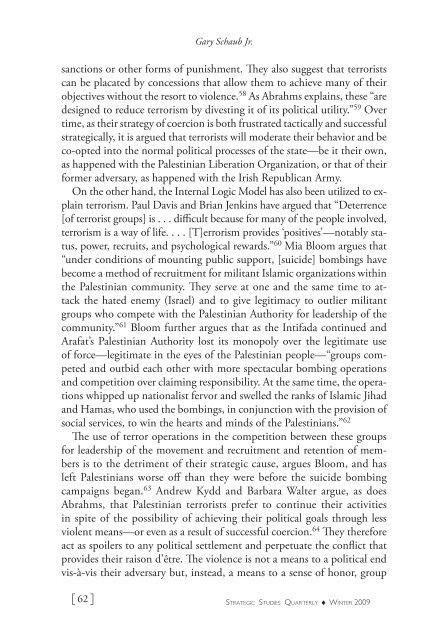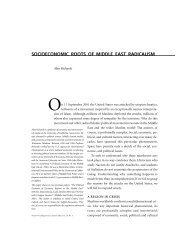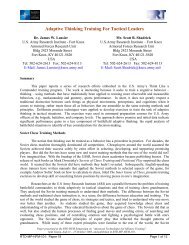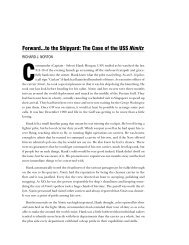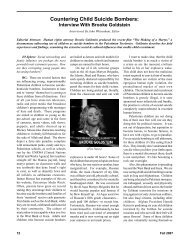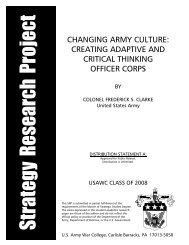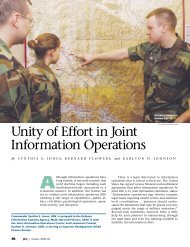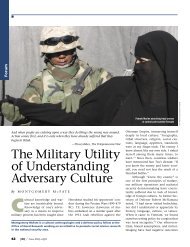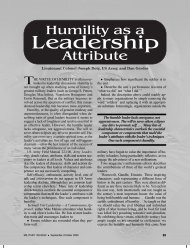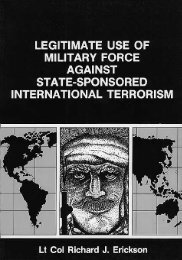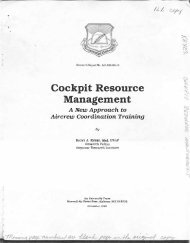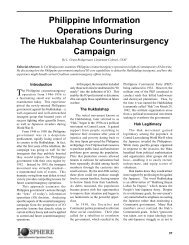When Is Deterrence Necessary? Gauging Adversary Intent
When Is Deterrence Necessary? Gauging Adversary Intent
When Is Deterrence Necessary? Gauging Adversary Intent
You also want an ePaper? Increase the reach of your titles
YUMPU automatically turns print PDFs into web optimized ePapers that Google loves.
Gary Schaub Jr.<br />
sanctions or other forms of punishment. They also suggest that terrorists<br />
can be placated by concessions that allow them to achieve many of their<br />
objectives without the resort to violence. 58 As Abrahms explains, these “are<br />
designed to reduce terrorism by divesting it of its political utility.” 59 Over<br />
time, as their strategy of coercion is both frustrated tactically and successful<br />
strategically, it is argued that terrorists will moderate their behavior and be<br />
co-opted into the normal political processes of the state—be it their own,<br />
as happened with the Palestinian Liberation Organization, or that of their<br />
former adversary, as happened with the Irish Republican Army.<br />
On the other hand, the Internal Logic Model has also been utilized to explain<br />
terrorism. Paul Davis and Brian Jenkins have argued that “<strong>Deterrence</strong><br />
[of terrorist groups] is . . . diffcult because for many of the people involved,<br />
terrorism is a way of life. . . . [T]errorism provides ‘positives’—notably status,<br />
power, recruits, and psychological rewards.” 60 Mia Bloom argues that<br />
“under conditions of mounting public support, [suicide] bombings have<br />
become a method of recruitment for militant <strong>Is</strong>lamic organizations within<br />
the Palestinian community. They serve at one and the same time to attack<br />
the hated enemy (<strong>Is</strong>rael) and to give legitimacy to outlier militant<br />
groups who compete with the Palestinian Authority for leadership of the<br />
community.” 61 Bloom further argues that as the Intifada continued and<br />
Arafat’s Palestinian Authority lost its monopoly over the legitimate use<br />
of force—legitimate in the eyes of the Palestinian people—“groups competed<br />
and outbid each other with more spectacular bombing operations<br />
and competition over claiming responsibility. At the same time, the operations<br />
whipped up nationalist fervor and swelled the ranks of <strong>Is</strong>lamic Jihad<br />
and Hamas, who used the bombings, in conjunction with the provision of<br />
social services, to win the hearts and minds of the Palestinians.” 62<br />
The use of terror operations in the competition between these groups<br />
for leadership of the movement and recruitment and retention of members<br />
is to the detriment of their strategic cause, argues Bloom, and has<br />
left Palestinians worse off than they were before the suicide bombing<br />
campaigns began. 63 Andrew Kydd and Barbara Walter argue, as does<br />
Abrahms, that Palestinian terrorists prefer to continue their activities<br />
in spite of the possibility of achieving their political goals through less<br />
violent means—or even as a result of successful coercion. 64 They therefore<br />
act as spoilers to any political settlement and perpetuate the conflict that<br />
provides their raison d’être. The violence is not a means to a political end<br />
vis-à-vis their adversary but, instead, a means to a sense of honor, group<br />
[ 62 ]<br />
Strategic Studies Quarterly ♦ Winter 2009


